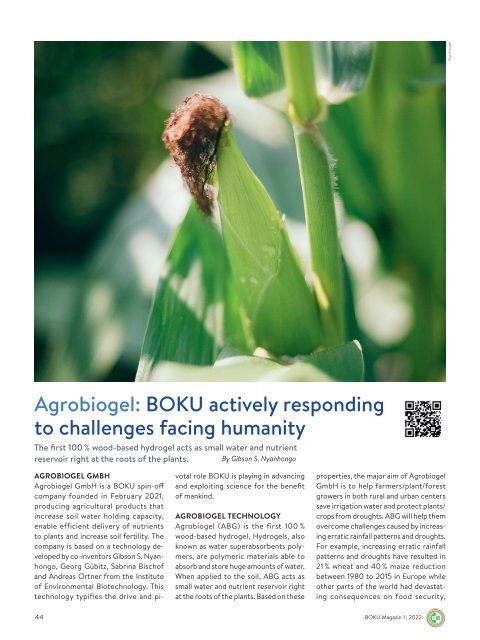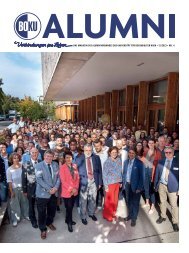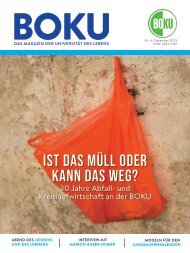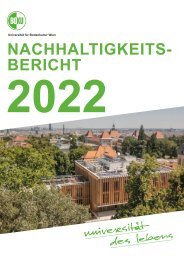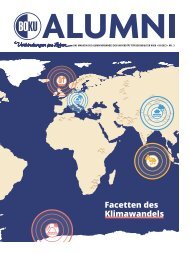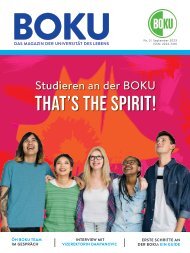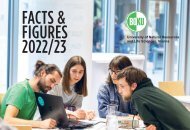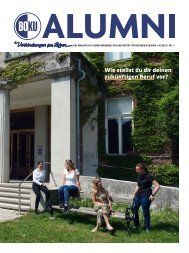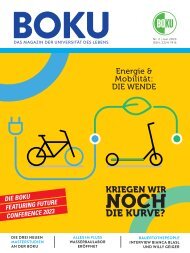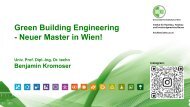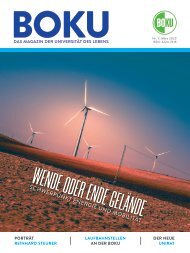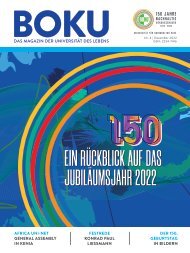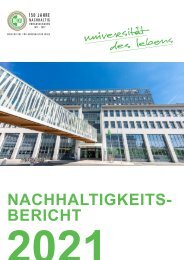BOKU Magazin 1/2022
Inhalt 3 Editorial Rektorin Schulev-Steindl 4 Vorwort Vizerektor Obinger 6 Gastkommentar Rainer Schultheis 8 Innovation aus wissenschaftlicher Perspektive 10 BOKU:BASE 12 BOKU-Entrepreneurship Education 15 Youth Entrepreneurship Week 16 Die „Obstraupe“ 17 Bauer sucht Hof 18 Auf dem richtigen Holzweg 19 Abgeltung von Waldökosystemleistungen 20 [sic!] für innovative Studierende 22 ImproveM 23 Copernicus für Australien 24 Innovationen im waldbasierten Sektor 26 Technologietransfer 29 Forscher*innen als Gründer*innen 30 BOKU-Erfinderinnen über Geistesblitze 34 Open Innovation: How to? 36 Eine Waschmaschine für Viren 38 Von der Muthgasse an die Nasdaq 40 Evercyte: „Forever is just enough“ 42 Interview Regina und Johannes Grillari 44 Agrobiogel 46 Preisverleihungen an der BOKU 48 Partner*innen der BOKU 50 Wie die BOKU Gründer*innen unterstützt 52_BOKU-Spin-off BrightComSol 54 BOKU River Lab 56 Junge Forscher*innen ausgezeichnet 58 Interview Rektorin Eva Schulev-Steindl 61 Schwerpunkte der Vizerektor*innen 62_Porträt Vizerektor Karsten Schulz 64 Auftakt zum Jubiläumsjahr 67 Zukunftskonferenz „BOKU Featuring Future“ 68 Interview Kurt Weinberger 70 Interview Christian Eckermann 72 Doppelinterview Markus Mühleisen und Norbert Harringer 74 Interview Erwin Hameseder 76 Porträt Bernhard Spangl 79 Die innere Dimension der Nachhaltigkeit 82 INTRINSIC, ein neuer didaktischer Ansatz 84 Gender & Diversity 86 SPLITTER 87 Care4GREEN 88 ORF-Archiv an der BOKU-Bibliothek 90 Forschung: FAQ 91 Strategische Kooperation BOKU Umweltbundesamt 92 Quo vadis Bioökonomie? 94 boDEREC-CE
Inhalt
3 Editorial Rektorin Schulev-Steindl
4 Vorwort Vizerektor Obinger
6 Gastkommentar Rainer Schultheis
8 Innovation aus wissenschaftlicher Perspektive
10 BOKU:BASE
12 BOKU-Entrepreneurship Education
15 Youth Entrepreneurship Week
16 Die „Obstraupe“
17 Bauer sucht Hof
18 Auf dem richtigen Holzweg
19 Abgeltung von Waldökosystemleistungen
20 [sic!] für innovative Studierende
22 ImproveM
23 Copernicus für Australien
24 Innovationen im waldbasierten Sektor
26 Technologietransfer
29 Forscher*innen als Gründer*innen
30 BOKU-Erfinderinnen über Geistesblitze
34 Open Innovation: How to?
36 Eine Waschmaschine für Viren
38 Von der Muthgasse an die Nasdaq
40 Evercyte: „Forever is just enough“
42 Interview Regina und Johannes Grillari
44 Agrobiogel
46 Preisverleihungen an der BOKU
48 Partner*innen der BOKU
50 Wie die BOKU Gründer*innen unterstützt
52_BOKU-Spin-off BrightComSol
54 BOKU River Lab
56 Junge Forscher*innen ausgezeichnet
58 Interview Rektorin Eva Schulev-Steindl
61 Schwerpunkte der Vizerektor*innen
62_Porträt Vizerektor Karsten Schulz
64 Auftakt zum Jubiläumsjahr
67 Zukunftskonferenz „BOKU Featuring Future“
68 Interview Kurt Weinberger
70 Interview Christian Eckermann
72 Doppelinterview Markus Mühleisen und Norbert Harringer
74 Interview Erwin Hameseder
76 Porträt Bernhard Spangl
79 Die innere Dimension der Nachhaltigkeit
82 INTRINSIC, ein neuer didaktischer Ansatz
84 Gender & Diversity
86 SPLITTER
87 Care4GREEN
88 ORF-Archiv an der BOKU-Bibliothek
90 Forschung: FAQ
91 Strategische Kooperation BOKU Umweltbundesamt
92 Quo vadis Bioökonomie?
94 boDEREC-CE
Sie wollen auch ein ePaper? Erhöhen Sie die Reichweite Ihrer Titel.
YUMPU macht aus Druck-PDFs automatisch weboptimierte ePaper, die Google liebt.
Agrobiogel<br />
Agrobiogel: <strong>BOKU</strong> actively responding<br />
to challenges facing humanity<br />
The first 100 % wood-based hydrogel acts as small water and nutrient<br />
reservoir right at the roots of the plants. By Gibson S. Nyanhongo<br />
AGROBIOGEL GMBH<br />
Agrobiogel GmbH is a <strong>BOKU</strong> spin-off<br />
company founded in February 2021,<br />
producing agricultural products that<br />
increase soil water holding capacity,<br />
enable efficient delivery of nutrients<br />
to plants and increase soil fertility. The<br />
company is based on a technology developed<br />
by co-inventors Gibson S. Nyanhongo,<br />
Georg Gübitz, Sabrina Bischof<br />
and Andreas Ortner from the Institute<br />
of Environmental Biotechnology. This<br />
technology typifies the drive and pivotal<br />
role <strong>BOKU</strong> is playing in advancing<br />
and exploiting science for the benefit<br />
of mankind.<br />
AGROBIOGEL TECHNOLOGY<br />
Agrobiogel (ABG) is the first 100 %<br />
wood-based hydrogel. Hydrogels, also<br />
known as water superabsorbents polymers,<br />
are polymeric materials able to<br />
absorb and store huge amounts of water.<br />
When applied to the soil, ABG acts as<br />
small water and nutrient reservoir right<br />
at the roots of the plants. Based on these<br />
properties, the major aim of Agrobiogel<br />
GmbH is to help farmers/plant/forest<br />
growers in both rural and urban centers<br />
save irrigation water and protect plants/<br />
crops from droughts. ABG will help them<br />
overcome challenges caused by increasing<br />
erratic rainfall patterns and droughts.<br />
For example, increasing erratic rainfall<br />
patterns and droughts have resulted in<br />
21 % wheat and 40 % maize reduction<br />
between 1980 to 2015 in Europe while<br />
other parts of the world had devastating<br />
consequences on food security,<br />
44 <strong>BOKU</strong> <strong>Magazin</strong> 1 | <strong>2022</strong>


